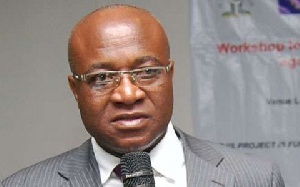 Majority Leader in parliament, Osei Kyei-Mensah-Bonsu
Majority Leader in parliament, Osei Kyei-Mensah-Bonsu
Majority Leader in parliament, Osei Kyei-Mensah-Bonsu, has backed calls for the prosecution of culpable directors of defunct local banks.
His comments follow a suit filed by receiver PwC over the collapse of Capital Bank. Pastor Mensa Otabil, his International Central Gospel Church (ICGC) and 13 other shareholders and directors of the now-defunct Capital Bank have been sued by Messrs. Vish Ashiagbor and Eric Nana Nipah, both of accounting and auditing firm PricewaterhouseCoopers, in connection with collapse of the bank in 2017.
“The BoG has a unit [monitoring unit], and those of them who are seen to have compromised their positions will suffer. I am sure about that; we must begin from somewhere and sanitize the banks,” he told pressmen in an interview at Parliament House on Tuesday.
He also noted that the prosecution of directors is the way to go, and believes “if anyone is found to have breached the law, that person must certainly face the music”.
Capital Bank and UT Bank were both declared irredeemably illiquid by the Bank of Ghana in August 2017, and were then taken over by the state-owned GCB Bank.
According to Kyei Mensah-Bonsu, the turbulence in the banks’ fold is one of the major factors affecting the cost of foreign currency – especially the dollar.
“You all know what occasioned the world financial meltdown; it was disturbances in some of the banks starting with Lehman Brothers, and that really caused world turbulence and the cedi at the time depreciated, the dollar suffered. Now, today, we have a similar thing playing locally in our system.”
He urged Ghanaians to demonstrate goodwill to ensure that sanity is brought to the banking system, which will ultimately help grow the economy.
Background
In August, the central bank announced that the seven indigenous banks’ collapse has come at a great cost, projected to cost an additional GH¢5.76billion to the taxpayer who is already saddled with the GH¢2.2billion government doled out to settle the liabilities of UT and Capital Banks.
There are currently 12 local banks in operation following the seven banks’ collapse. This has prompted fears that the majority of local banks will struggle to meet the minimum capital requirement.